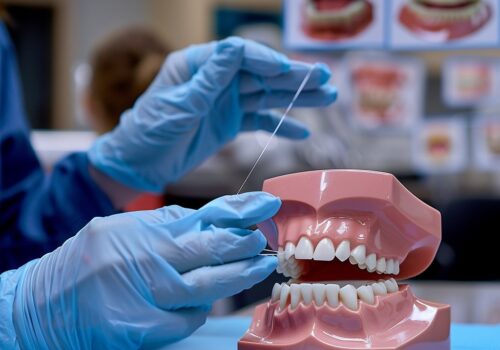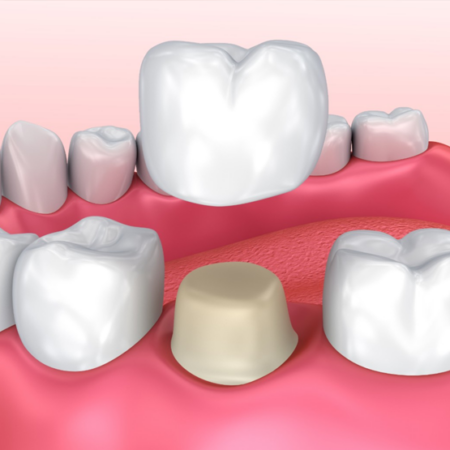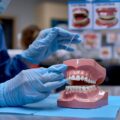
Who is the one healthcare provider you see more than any other? For many people, the answer is: their general dentist. There’s a good reason for that—it’s because general dentistry is uniquely oriented toward the prevention of disease. In fact, it is estimated that nearly 65 percent of all dental procedures are either diagnostic or preventive. By placing a strong emphasis on oral health and hygiene, general dentists help people avoid the progression of oral diseases. If left untreated, these eventually result in pain, lost time at work or school—and an estimated cost of billions of dollars each year.
General dentists are the main providers of dental care to people of all ages. At a routine visit to your family dentist, you will probably have a thorough examination of your mouth (including teeth, gums, and other structures), a professional cleaning, and a discussion about your dental (and overall) health. If your exam reveals the presence of tooth decay, you will probably also have a filling in the affected tooth. Yet these procedures, while common, are hardly the only services your general dentist provides.
What Do General Dentists Do?
General dentists provide a wide array of services that are vital to your continued health, including:
Preventive Services
These help you maintain good oral health by stopping disease before it takes hold in your mouth. Regular exams (including diagnostic images such as x-rays) and professional teeth cleanings are a cornerstone of prevention. Your general dentist may give you detailed instructions to improve your at-home oral hygiene, and may also recommend preventive treatments such as sealants, if needed. And if you lead an active lifestyle, you can be fitted with a custom-made mouthguard at your dentist’s office.
Restorative Services

When a problem is found, your dentist will ensure you get timely and appropriate treatment. Probably the most common (and highly effective) dental restoration involves removing tooth decay and placing a filling in the affected tooth. But that’s not the only restorative procedure general dentists provide. They offer you a place to go when you need prompt treatment for dental trauma—for example, a broken, loosened or knocked-out tooth. General dentists can diagnose and treat the causes of tooth pain or periodontal (gum) disease. They may also offer treatments for missing teeth, place crowns or bridgework, and help you get fitted with dentures. Some provide more advanced treatments, such as root canal therapy, orthodontics, and dental implants, as well.
Cosmetic Procedures
Many general dentists can help you get the sparkling smile you’ve always wanted with a range of cosmetic procedures. These include teeth whitening, cosmetic bonding—even porcelain veneers. If a brighter smile is what you’re looking for, ask your general dentist about a smile makeover.
Overall Health Concerns
In many respects, your oral health can be seen as a mirror of your general health. Some dental problems may reflect issues in other parts of your body, and vice versa. For example, untreated oral infections can lead to poorer control of diabetes, an increased incidence of cardiovascular disease, and complications during pregnancy. General dentists are trained to identify these and other issues, and offer appropriate treatment or referral when needed. One special concern is obstructive sleep apnea, a potentially deadly condition that can sometimes be treated with an oral appliance. General dentists can also offer nutritional counseling, advice on tobacco cessation and general health and wellness information.
What Qualifications Do General Dentists Have?
After completing their undergraduate education, all general dentists have successfully completed four years at an accredited dental school. In addition, they have fulfilled the requirements (including testing and continuing education) of state licensing boards. Some dentists have the initials DMD (Doctor of Dental Medicine) following their names, while others have DDS (Doctor of Dental Surgery). The only difference between the two is the title used on their dental school degrees; their education and training is exactly the same.
In addition to their standard training, some general dentists receive special training in particular areas—for example, implant placement, cosmetic procedures, or other therapies.
When Should I See The Dentist?
The short answer is: every six months for preventative services—and otherwise, whenever you have a concern about your oral health. You may have a clear signal (such as a toothache or bleeding gums) that something in your mouth needs attention. Or, you may have heard of a cosmetic procedure that you’d like to find out more about. In either case, don’t hesitate to call the dental office.
In terms of routine dental appointments, there isn’t a single schedule that fits all patients. Depending on your individual circumstances, your dentist may want to see you twice a year, every three months, or another interval. Whatever it is, don’t let those appointments go! Keeping up with the recommended schedule of preventive treatment and practicing effective oral hygiene at home are the two best ways to prevent dental disease—and keep your smile looking bright and healthy for the rest of your life.














Leave a Reply